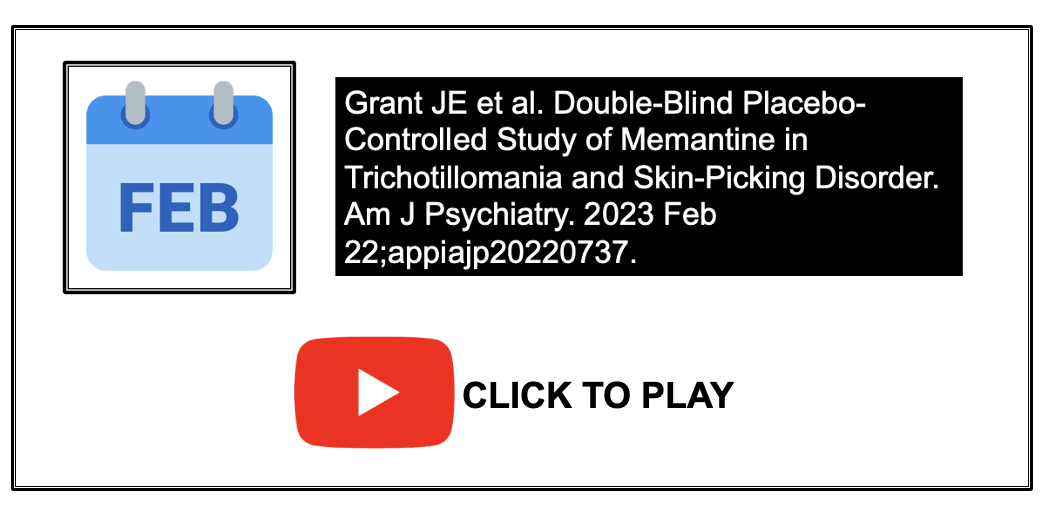Memantine for the Treatment of Trichotillomania (TTM)
Trichotillomania is an impulse control disorder associated with repeated hair pulling and hair loss. We have reviewed the DSM V Criteria several times before.
Behavioral therapy is generally regarded as the first-line treatment (controlled studies support the use of habit reversal or acceptance-enhanced behavior therapy) but trained therapists are difficult to find. There is no medication currently approved by the U.S. Food and Drug Administration (FDA) for these disorders although drugs such as olanzapine, N-acetylcysteine, or clomipramine haven been shown to have benefit in placebo controlled trials.
Glutamate is the major excitatory neurotransmitter in the nervous system. The motor habits and the intrusive urges that drive the repeated pulling in TTM may be at least partially driven by the glutamate system
Grant et al 2023
A new study looks at the potential role of a drug memantine in the treatment of trichotillomania and skin picking disorder.
Memantine was FDA approved in 2003 for moderate to severe Alzheimer’s disease. The drug is a glutamate receptor antagonist that targets excessive glutamatergic drive – which, as mentioned, is through to be relevant in TTM. The most common side effects of memantine (occurring in 5% or more of patients) are dizziness, constipation, confusion and headaches; less common side effects (occurring in less than 5% of patients) are hypertension, somnolence and visual hallucinations.
In this study, the authors sought to determine whether memantine is more effective than placebo in reducing hair-pulling and skin-picking behavior.
One hundred adults with TTM or skin- picking disorder were enrolled in a double-blind trial of memantine (dosing range, 10–20 mg/day) or placebo for 8 weeks. 86 participants were women; mean age, 31.4 years. Participants received memantine 10 mg (N=55) or placebo (N=45) for the first 2 weeks, then 20 mg for the next 6 weeks.
Participants were assessed with measures of pulling and picking severity. The prespecified primary outcome measure was treatment- related change on the NIMH Trichotillomania Symptom Severity Scale, modified to include skin picking.
Results
Compared with placebo, memantine treatment was associated with significant improvements in scores on the NIMH scale, Sheehan Disability Scale, and Clinical Global Impressions severity scale.. At study endpoint, 60.5% of participants in the memantine group were “much or very much improved,” compared with 8.3% in the placebo group. The NNT was 2. Adverse events did not differ significantly between the treatment arms.
Conclusions:
This study found that memantine treatment resulted in statistically significant reductions in hair pulling and skin-picking symptoms compared with placebo. Memantine had relatively high efficacy given the low number needed to treat value. It was well tolerated.
Overall the glutamate system may prove to be a beneficial target in the treatment of compulsive behaviors. Ongoing research will likely consider longer trials of memantine and at higher doses, as well as other glutamate modulators (like N-acetyl cysteine).
For now, memantine remains a possible third line option for TTM. It may not be the starting point for treating TTM. That is best done with habit reversal therapy. However, it remains an option after consideration of other options. More studies are needed.
REFERENCE
Grant JE et al. Double-Blind Placebo-Controlled Study of Memantine in Trichotillomania and Skin-Picking Disorder. Am J Psychiatry. 2023 Feb 22;appiajp20220737.
This article was written by Dr. Jeff Donovan, a Canadian and US board certified dermatologist specializing exclusively in hair loss.


